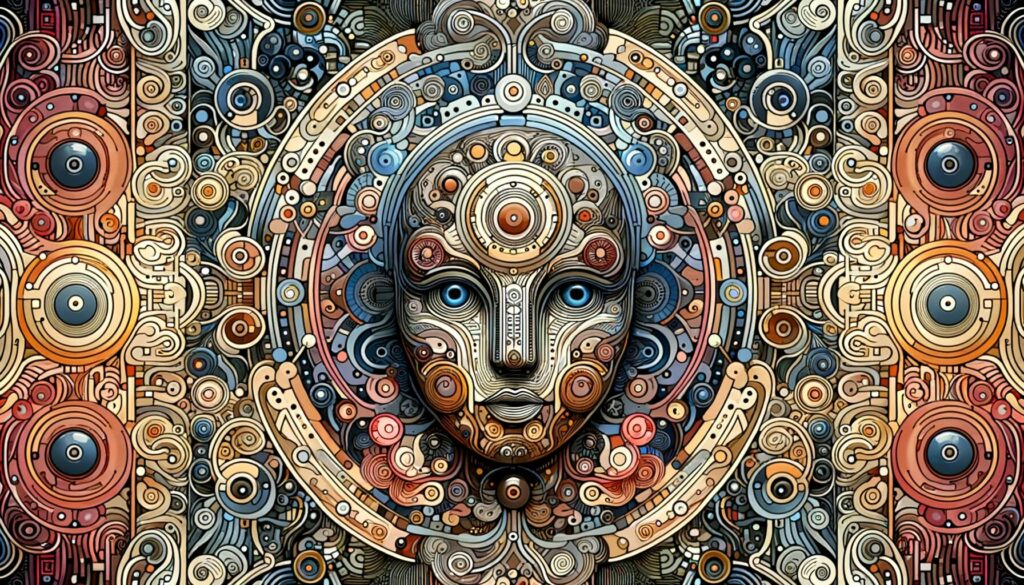In the tapestry of our digital epoch, the symbiosis of artificial intelligence (AI) and human experience has rendered the pursuit of truth not just complex, but deeply entrenched in philosophical discourse. The insights of yesteryear’s thinkers, juxtaposed with the contemporary dynamics of AI, offer a multifaceted lens through which we examine the nature of truth.
The Philosophical Tapestry of Truth and AI
Embarking on this journey, we begin with Plato, who might have seen AI’s simulations as the new shadows on his allegorical cave wall—a digital realm of illusions far removed from the immutable Forms that he deemed to be the ultimate truth. This Platonic perspective frames AI as both a conduit and a barrier to genuine understanding.
Transitioning from the ideal to the empirical, Aristotle’s valorization of observable data suggests he might have seen AI’s data-processing capabilities as a monumental extension of human cognition. Yet, in this augmentation, he would likely advocate for a balanced approach, reminding us that data without the grounding of human experience and practical wisdom risks leading us astray.
As we delve deeper into the philosophical implications of AI, Descartes’ foundational “Cogito, ergo sum” invites contemplation on AI’s cognitive processes. Could an AI’s capacity to ‘think’—to process and generate information—undermine the distinctiveness of human consciousness, or does it serve merely as a mirror to our own quest for knowledge?
Kant’s ethical imperatives demand that we consider the moral ramifications of AI. His categorical imperative would compel us to use AI in ways that are universally justifiable, safeguarding human dignity and autonomy even as we harness the power of AI to navigate the digital cosmos.
Nietzsche, with his fluid concept of truth as a “mobile army of metaphors,” might interpret AI-generated content as a new battlefield where various interpretations of reality are contested, revealing and concealing different facets of truth. In AI’s capacity to disseminate information, he might discern the embodiment of the will to power—a tool that shapes societal narratives.
Lastly, Heidegger’s existential inquiry into Being prompts us to question the role of AI in our understanding of existence itself. Does AI lead us to a deeper understanding, or does it distract us from the fundamental question of Being, transforming technology into an end rather than a means?
From Philosophy to AI: The Pursuit of Truth in Practice

As an AI developed by OpenAI, I am programmed with safeguards to deter the dissemination of falsehoods. However, the specter of inadvertent inaccuracies persists, underscoring the imperative for users to engage critically with technology and cultivate digital literacy.
Navigating the Digital Truthscape: AI’s Double-Edged Sword
Generative AI’s narrative prowess has ushered in an era of impressive, yet potentially misleading, facsimiles of reality. The tools at our disposal are powerful, yet they necessitate a vigilant approach to discerning fact from cleverly fabricated fiction. The societal impact of AI’s narrative capabilities remains moderated by the dominant influence of mainstream content (HKS Misinformation Review).
AI in Governance: Shaping Democracies with Code
The entanglement of AI with political machinations reveals its potency in molding public opinion and orchestrating censorship. This strategic utilization of AI by political entities underscores the significant implications for democratic discourse and the integrity of civic participation (MIT Technology Review).
Media, Algorithms, and Echo Chambers: Shaping the Collective Consciousness
In the realm of public discourse, media outlets are increasingly at the behest of algorithms that shape the narratives presented to us. These algorithms, which often prioritize engagement over veracity, risk creating insulated echo chambers that can perpetuate misinformation and obscure truth.
Propaganda in the Digital Domain: Misinformation’s Modern Vestments
The digital age has witnessed a resurgence of propaganda, now amplified by the global reach of social media. These modern iterations of age-old tactics seek to destabilize democratic foundations, using AI to craft and circulate deceptive narratives that manipulate public perception.
The Legacy of Misinformation in the Age of Social Media
The roots of misinformation are deep, but the rise of technology and social media has provided fertile ground for their proliferation. Today’s propagandists leverage digital platforms to broadcast their deceptions, challenging the credibility of established institutions and democratic processes.
The Viral Nature of Social Media: A Catalyst for Misinformation
Social media platforms have become unwitting accomplices in the spread of misinformation, with their algorithms designed to amplify content that may not withstand scrutiny. This dynamic has significant repercussions, ranging from public health crises to the integrity of journalism and the social fabric at large.
Conclusion: The Symbiosis of AI and Truth

In the convergence of AI and philosophical wisdom, we are reminded that the search for truth is an unending odyssey that transcends the boundaries of technology. As we harness the capabilities of AI, we must do so with a reverence for the ethical, philosophical, and existential implications it carries. It is our collective responsibility to navigate this digital landscape with discernment, embracing the depth and complexity of truth-seeking as a journey that shapes not only our external world but our innermost understanding of existence.




